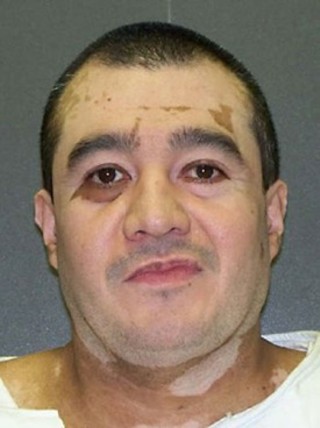Texas Clemency Process Poor, But Good Enough for Government Work
BPP and court deny Tamayo execution reprieve. Last stop, Perry
By Jordan Smith, 10:30AM, Wed. Jan. 22, 2014
Federal Judge Lee Yeakel on Tuesday afternoon denied a bid by condemned Texas inmate Edgar Tamayo to stay his execution pending an inquiry into whether the clemency process undertaken by the Texas Board of Pardons and Paroles affords minimal due process protections required by law – a decision that cleared the way for tonight's planned execution.
Yeakel reviewed confidential materials provided to him by the BPP and concluded that there is nothing to indicate the Board does not "comply with the minimal constitutional-due-process requirements set forth by the United States Supreme Court," he wrote. Indeed, he wrote, there is nothing to suggest the BPP's procedures have undergone any significant change since Yeakel's colleague, Judge Sam Sparks, ruled on a similar challenge in 1998. In that case, brought by a Canadian national, Joseph Faulder, Sparks found that while it "is abundantly clear the Texas clemency procedure is extremely poor and certainly minimal," it nonetheless met the "minimal" standards required by the Supreme Court.
Shortly after Yeakel's ruling, the Texas BPP voted to deny Tamayo's bid for clemency. Unless Gov. Rick Perry steps in with a stay, the BPP vote and Yeakel ruling have cleared the way for Tamayo to be executed tonight, after 6pm.
The court ruling and Board vote bring to a near close months of legal wrangling in Tamayo's case. Tamayo was convicted and sentenced to die for the 1994 murder of Houston Police Officer Guy Gaddis. A Mexican national, he was never appraised of his right, under the Vienna Convention, to contact the Mexican consulate for legal assistance.
In 2004, the International Court of Justice ruled in the case of 51 Mexican nationals on death rows in the U.S. – including Tamayo – that the country must review each case for violations of the consular access provision included in the 1963 Convention, to which the U.S. is a signatory. U.S. officials have tried to have Texas agree to the ICJ ruling, but the state courts have balked, and the U.S. Supreme Court ultimately ruled that it would take and act of Congress to bind the states to the ICJ ruling.
Tamayo's case stands out among Mexican nationals put to death in Texas because his claim that the failure to provide him with consular access prejudiced the outcome of his case – sending him to death row instead of a life in prison – has never been reviewed by any court.
Although Texas officials – including Attorney General Greg Abbott – have represented that court review would be afforded in each case, inTamayo's case the state has argued at each step that Tamayo's request for review should be denied because of procedural default rules.
That is in part what brought his attorneys to federal court this week: In the absence of any court consideration of his claims, the only remaining avenue for serious review rested with the clemency process, a final "safety valve" desperately needed to protect Tamayo's rights, lawyers for the inmate argued Tuesday morning. The clemency process offers the executive branch of government "and opportunity to correct miscarriages of justice that the courts have failed to address," lawyer Sandra Babcock argued.
The state countered, however, that under the minimal protections precedent, Yeakel had not authority to question the BPP's process and further had no ability to stay Tamayo's execution. A due process challenge to a clemency process has never once been successful, Deputy Solicitor General Andrew Oldham argued. Executive clemency is "cloaked in executive privilege" and is "completely immunized," he argued.
In ruling against Tamayo, Yeakel noted that there is nothing to "reflect" that the BPP operates in any way that significantly differs from the lackluster process Sparks found in 1998, though he noted that materials provided to him for private inspection reflect that board members have been provided "extensive materials" addressing Tamayo's rights under the Vienna Convention, the promises and concerns of various public officials, and information about Tamayo's possible mental retardation (a claim also never reviewed by the courts).
Tamayo's lawyers, Babcock and Maurie Levin, were "deeply" disappointed by the court's ruling, they said in a press statement. "It is inexcusable that, in a case of this magnitude, one with international repercussions that could place millions of Americans around the world in harms way, the Texas Board of Pardons and Paroles refuses even to meet to discuss the merits of Mr. Tamayo's clemency application," reads the statement.
Got something to say on the subject? Send a letter to the editor.
A note to readers: Bold and uncensored, The Austin Chronicle has been Austin’s independent news source for over 40 years, expressing the community’s political and environmental concerns and supporting its active cultural scene. Now more than ever, we need your support to continue supplying Austin with independent, free press. If real news is important to you, please consider making a donation of $5, $10 or whatever you can afford, to help keep our journalism on stands.
Jordan Smith, Oct. 4, 2013
Jordan Smith, Aug. 9, 2013
May 22, 2014
Edgar Tamayo, Vienna Convention, death penalty, Death Watch, capital punishment, criminal justice, courts, Lee Yeakel, Board of Pardons and Paroles, Maurie Levin, Sandra Babcock, Andrew Oldham, Greg Abbott, consular notification












